Books published

Books published by academics in the Department of Gender Studies include:

Creative Critical Interventions for Social Justice - Natasha Tanna (Editor), Abeyamí Ortega Domínguez (Editor), Hakan Sandal-Wilson (Editor) (2026)
Creative Critical Interventions for Social Justice is an edited volume grounded in a commitment to politically engaged research that moves beyond traditional scholarly forms. It examines knowledge that is often excluded from conventional academic production and explores the potential for creative critical writing and cultural production to advance social justice-focused research and practice. The book addresses hierarchies of knowledge creation and knowledge creators, bringing together artists, educators, community organisers, activists, researchers and writers working from decolonial, antiracist, queer and transfeminist perspectives.

Deconstructing Refugee Women's Empowerment: A Comparative Approach to British and French Aid Structures - Zeynep Kilicoglu (2025)
This new book explores how self-identified feminist or women’s asylum organisations in the United Kingdom and France address refugee women’s empowerment in their operations and how these perpetuate or disrupt global hierarchies.
Acknowledging how some of the current practices still impose vulnerability on women, it aims to contribute to the newly established literature exploring how refugeehood and asylum-seeking are not necessarily disempowering for fleeing women, as they can provide new opportunities for negotiating gender norms, supporting women to practice agency.

Desi Queers: LGBTQ+ South Asians and Cultural Belonging in Britain - Churnjeet Mahn, Rohit K. Dasgupta and DJ Ritu (2025)
Desi Queers reveals how diasporic South Asians have shaped LGBTQ+ movements and communities in Britain, from the 1970s to the present day. Weaving the history of 1980s anti-racism with the emergence of Black LGBTQ+ and feminist coalitions, this book highlights landmark moments in British queer life and culture through South Asian lives, and illuminates British histories of colour through queer politics and creativity.
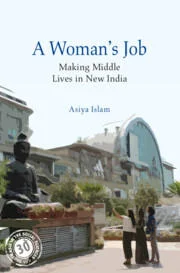
A Woman's Job: Making Middle Lives in New India - Asiya Islam (2025)
Against the backdrop of rapid socio-economic change in post-1990 India, scholars and policy makers have expressed surprise at the low rate of women's participation in the workforce, particularly in urban areas. A Woman's Job presents a unique urban ethnography of young lower middle class women's lives in Delhi as they weave in and out of service employment, education, and domestic contracts. Urban, educated, and skilled, these young women seek employment in cafes, malls, call centres, and offices in the globalising landscape of Delhi. Their participation in work enables access to 'things', such as, jeans, smartphones, English language, and the metro, that symbolise global modernity. However, caught in a web of gender, class, and caste inequalities, their identification as 'working' women also generates social anxieties. The book shows how women adopt 'middle-ness' as a strategy of life-making at the multiple sites of work, home, and leisure.
Read an excerpt in the LSE Review of Books.
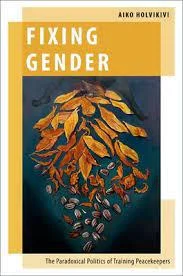
Fixing Gender: The Paradoxical Politics of Training Peacekeepers - Aiko Holvikivi (2024)
Fixing Gender is a book about the epistemic life of the term ‘gender’ and the political work that this lively concept does. In recent years, gender training has become the go-to solution for any number of institutional issues. Among others, it has become a requirement for soldiers and police officers deploying overseas as peacekeepers. Through such training, ‘gender’—a term with critical feminist lineage—is taken up by martial institutions shaped by hegemonic masculinity.

Transnational Anti-Gender Politics: Feminist Solidarity in Times of Global Attacks - (eds) AikoHolvikivi, Billy Holzberg, Tomás Ojeda (2024)
Part of the Thinking Gender in Transnational Times series from Palgrave Macmillan. It covers a wide range of fields, including reproductive health and rights, VAWG, and sexual and higher education; makes a strong argument for adopting a transnational feminist perspective to understanding anti-gender; and includes contributions from over 14 different countries across the Americas, Europe, Asia, Africa, and the Middle East.

Vernacular Rights Cultures - Sumi Madhok (2022)
Vernacular Rights Cultures offers a bold challenge to the dominant epistemologies and political practices of global human rights. It argues that decolonising global human rights calls for a serious epistemic accounting of the historically and politically specific encounters with human rights, and of the forms of world-making that underpin the stakes and struggles for rights and human rights around the globe.
Read a review in the LSE Review of Books.

Women in Place - Nazanin Shahrokni (2019)
While much has been written about the impact of the 1979 Islamic revolution on life in Iran, discussions about the everyday life of Iranian women have been glaringly missing. Women in Place offers a gripping inquiry into gender segregation policies and women’s rights in contemporary Iran. Author Nazanin Shahrokni takes us onto gender-segregated buses, inside a women-only park, and outside the closed doors of stadiums where women are banned from attending men’s soccer matches.

Detecting the Social: Order and Disorder in Post-1970s Detective Fiction - (eds) Mary Evans, Hazel Johnstone, Sarah Moore (2019)
Conventional sociological accounts of fiction generally comprehend its value in terms of the ways in which it can illustrate, enlarge or help to articulate a particular social theory. Evans, Moore, and Johnstone suggest a different approach, and demonstrate that by taking a group of detective novels, we can unveil so far unidentified, but crucial, theoretical ideas about what it means to be an individual in the twenty-first century.

Sexualised Crimes, Armed Conflict and the Law: The International Criminal Court and the Definitions of Rape and Forced Marriage - Hannah Baumeister (2018)
Sexualised Crimes, Armed Conflict and the Law draws on feminist and constructivist theories and offers a comprehensive theoretical and empirical examination of the definition of rape and forced marriage.

The Political Imaginary of Sexual Freedom - Leticia Sabsay (2018)
This book develops a performative and relational approach to gendered and sexualised bodies conceived as distinct from the more limited individualistic idea of sexual identity and orientation that is at play within notions of progress in contemporary transnational sexual politics.

Considering Emma Goldman: Feminist Political Ambivalence and the Imaginative Archive - Clare Hemmings (2018)
In Considering Emma Goldman Clare Hemmings examines the significance of the anarchist activist and thinker for contemporary feminist politics. Rather than attempting to resolve the tensions and problems that Goldman's thinking about race, gender, and sexuality pose for feminist thought, Hemmings embraces them, finding them to be helpful in formulating a new queer feminist praxis.
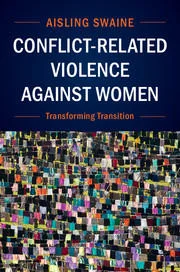
Conflict-Related Violence against Women - Dr Aisling Swaine (2018)
By comparatively assessing three conflict-affected jurisdictions (Liberia, Northern Ireland and Timor-Leste), Conflict-Related Violence against Women empirically and theoretically expands current understanding of the form and nature of conflict-time harms impacting women.

The Persistence of Gender Inequality - Mary Evans (2017)
In 'The Persistence of Gender Inequality', Mary Evans argues that optimistic narratives of progress and emancipation have served to obscure long-term structural inequalities between women and men, structural inequalities which are not only about gender but also about general social inequality. In widening the lenses on the persistence of gender inequality, Evans shows how in contemporary debates about social inequality gender is often ignored, implicitly side-lining critical aspects of relations between women and men.

Thinking Gender in Transnational Times book series Professor Clare Hemmings, Dr Sadie Wearing and LSE Gender are editors in the Thinking Gender in Transnational Times book series by Palgrave Macmillan. Books in the series include: Gender, Agency and Coercion; Affective Relations and Rethinking Peacekeeping, Gender Equality and Collective Security.

Gender in the Media - Niall Richardson and Sadie Wearing (2014)
This lively and engaging text introduces students to the key contemporary issues in the study of gender and the media. Integrating cultural theory with text-based criticism, Gender in the Media analyses recent debates in feminist cultural theory, masculinity studies and queer theory, before applying these cultural paradigms to critical readings in relevant media contexts.

The SAGE Handbook of Feminist Theory (eds) Mary Evans, Clare Hemmings, Marsha Henry, Hazel Johnstone, Sumi Madhok, Ania Plomien and Sadie Wearing (2014)
At no point in recorded history has there been an absence of intense, and heated, discussion about the subject of how to conduct relations between women and men. This Handbook provides a comprehensive guide to these omnipresent issues and debates, mapping the present and future of thinking about feminist theory. The chapters gathered here present the state of the art in scholarship in the field, covering: epistemology and marginality; literary, visual and cultural representations; sexuality; macro and microeconomics of gender; conflict and peace. It is an essential reference work for advanced students and academics not only of feminist theory, but of gender and sexuality across the humanities and social sciences.

New Frontiers in Feminist Political Economy edited by Shirin M.Rai and Georgina Waylen (2013)
This book brings together the work of outstanding feminist scholars who reflect on the achievements of feminist political economy and the challenges it faces in the 21st century. Contributions from Marzia Fontana, Naila Kabeer, Sylvia Chant, Diane Elson, Irene van Staveren, Caren Grown, Radhika Balakrishnan, Ruth Pearson, Stephanie Barrientos, Shahra Razavi and Katherine Bickell.

Our Bodies, Whose Property? - Anne Phillips (2013)
Drawing on analyses of rape, surrogacy, and markets in human organs, Our Bodies, Whose Property? challenges notions of freedom based on ownership of our bodies and argues against the normalization of markets in bodily services and parts. Anne Phillips explores the risks associated with metaphors of property and the reasons why the commodification of the body remains problematic.
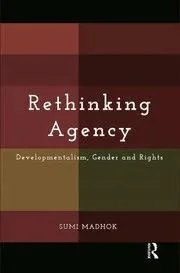
Rethinking Agency: Developmentalism, Gender and Rights - Sumi Madhok (2013)
This book proposes a new theoretical framework for agency thinking by examining the ethical, discursive and practical engagements of a group of women development workers in north-west India with developmentalism and individual rights.

Gender, Migration and Domestic Work: Masculinities, Male Labour & Fathering in the UK and USA - Majella Kilkey, Diane Perrons and Ania Plomien (2013)
As the rich have got richer and households have become busier, demand for commoditized household services has increased. While much is known about maids and nannies, this book is distinctive in focusing on masculinized domestic services.
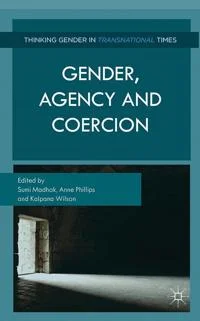
Gender, Agency and Coercion (eds) Sumi Madhok, Anne Phillips, Kalpana Wilson (2013)
This collection aims to think critically about agency and explore the relationship between agency and coercion in a range of regional, intellectual, ethical and political contexts. Contributions from Samantha Ashenden, Ngaire Donaghue, Mary Evans, Rosalind Gill, Clare Hemmings, Marsha Henry, Kimberly Hutchings, Emily Jackson, Amal Treacher Kabesh, Lois McNay, Sadie Wearing and Heather Widdows.

Race, Racism and Development: Interrogating history, discourse and practice by Kalpana Wilson (2012)
This is the first book to place constructions of race and racism at the centre of a comprehensive analysis of the dominant discourses and practices of development. The book tackles human rights, imperialism, culture, ethnic conflict, HIV/Aids and the role of diasporas, and highlights the latent racialisation in such debates to argue that development can only be understood within a full understanding of the relationship between north and south.
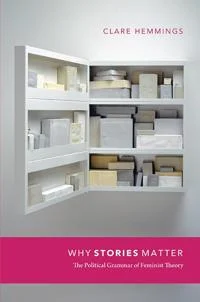
Why Stories Matter: The Political Grammar of Feminist Theory by Clare Hemmings (2011)
A powerful critique of the stories that feminists tell about the past four decades of Western feminist theory. Clare Hemmings examines the narratives that make up feminist accounts of recent feminist history, highlights the ethical and political dilemmas raised by these narratives, and offers innovative strategies for transforming them. Winner of the Feminist and Women's Studies Association (FWSA) Book Prize 2012.